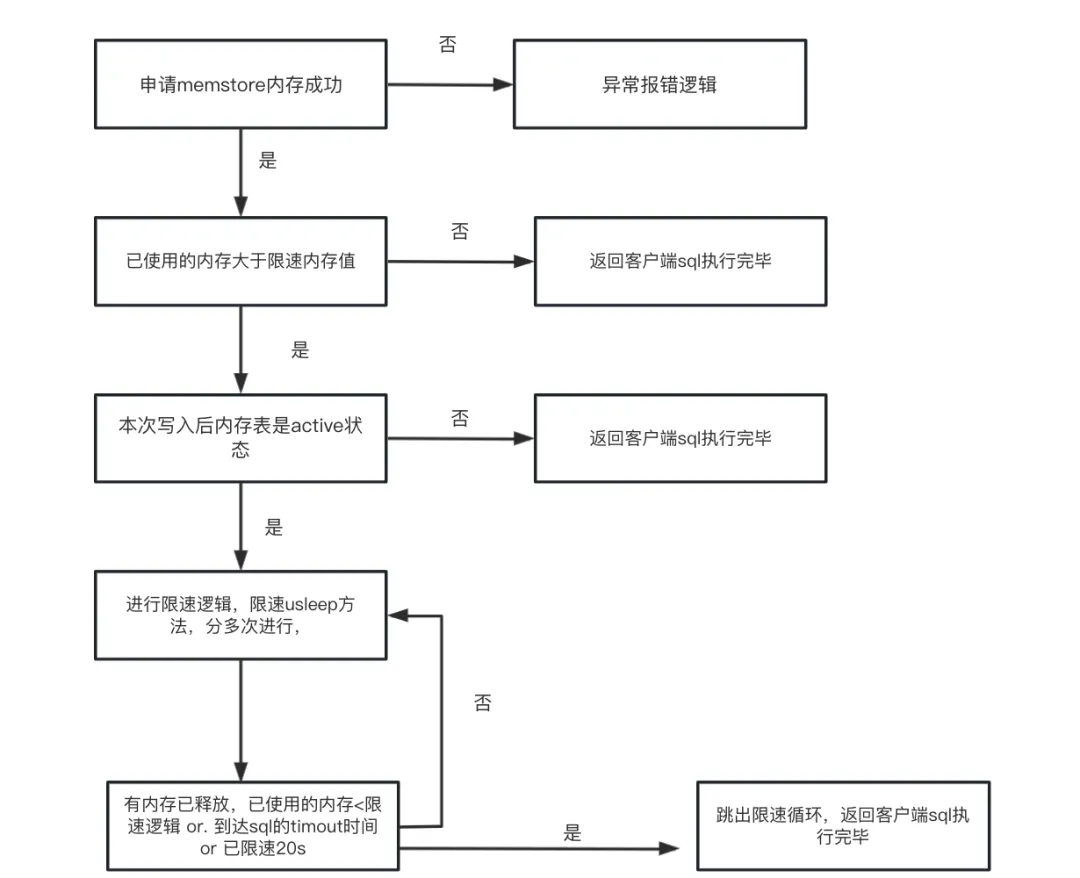OceanBase 功能解析:写入限速功能
OceanBase的写入限速机制,其核心目标是调节系统内各类写入操作(涵盖插入、更新及删除等)的执行速率,从而提升数据库整体的稳定性。本文通过解析两个关键参数,来详细阐述这一限速机制的具体实现机制。
本文作者:陈慧明,爱可生测试团队成员,主要参与dmp和dble自动化测试项目。
一、写入限速机制简介
OceanBase的写入限速机制,其核心目标是调节系统内各类写入操作(涵盖插入、更新及删除等)的执行速率,从而提升数据库整体的稳定性。本文接下来将通过解析两个关键参数,来详细阐述这一限速机制的具体实现机制。
- writing_throttling_trigger_percentage:设置写入速度的阈值百分比。当内存使用达到该阈值时,触发写入限速机制。默认值为60,取值范围为1到100(100表示关闭写入限速)。
- writing_throttling_maximum_duration:指定触发写入限速后,所需的剩余内存分配时间。默认值为2小时。通常情况下,不需要修改该参数。
请注意,OceanBase 2.2.30 及之后版本才开始支持该机制。
二、实现原理
1. 进入限速逻辑
当执行写入操作申请内存时,触发写入限速条件:已使用的 Memstore 内存超过设定的比例(比例阈值由 writing_throttling_trigger_percentage 参数确定),系统进入限速逻辑。
2. 多次限速
限速逻辑会将本次申请内存的任务分成多次进行限速。每次限速的执行时间最多为20毫秒。
3.系统在每次限速中进行一个限速循环,在限速循环中,系统会检查以下条件:
- 内存释放:系统检查内存是否已经释放足够多的内存(满足不进入限速的条件),系统已经不需要限速。
- SQL执行时间限制:系统检查SQL的执行时间是否已经达到限制。如果已经达到限制,则系统退出限速循环,并将SQL完成的信息发送给客户端。
- 休眠时间:系统检查是否已经休眠了20秒。如果已经休眠,则系统退出限速循环,并将SQL完成的信息发送给客户端。
4. 完成限速
如果上述任意一项条件满足,系统将退出限速循环,并将SQL完成的信息发送给客户端。这样可以确保SQL能够成功执行完成,并保证系统的稳定性。
5. 流程参考

三、源码解读
以下通过源码以一条insert语句的部分堆栈来解释writing_throttling_trigger_percentage和writing_throttling_maximum_duration是如何影响限速逻辑的。
ObTablet::insert_row_without_rowkey_check()
int ObTablet::insert_row_without_rowkey_check( ObRelativeTable &relative_table, ObStoreCtx &store_ctx, const common::ObIArray<share::schema::ObColDesc> &col_descs, const storage::ObStoreRow &row){ int ret = OB_SUCCESS; { // insert_row_without_rowkey_check 执行结束时会调用ObStorageTableGuard的析构函数,进行限速处理 ObStorageTableGuard guard(this, store_ctx, true); ObMemtable *write_memtable = nullptr; ... //write_memtable->set()会调用ObFifoArena::alloc()申请内存, 在分配内存时进行限速判断 else if (OB_FAIL(write_memtable->set(store_ctx, relative_table.get_table_id(), full_read_info_, col_descs, row))) ... } return ret;}该方法会实例化 ObStorageTableGuard类 , 限速的执行过程定义在该类的析构函数内, 所以程序会在执行完 write_memtable 后才进行限速。后续会进行写Memtable的流程,这里不做赘述, 大致调用堆栈如下:
| > oceanbase::storage::ObTablet::insert_row_without_rowkey_check(...) (/src/storage/tablet/ob_tablet.cpp:1425)| + > oceanbase::memtable::ObMemtable::set(...) (/src/storage/memtable/ob_memtable.cpp:339)| + - > oceanbase::memtable::ObMemtable::set_(...) (/src/storage/memtable/ob_memtable.cpp:2538)| + - x > oceanbase::memtable::ObMemtable::mvcc_write_(...) (/src/storage/memtable/ob_memtable.cpp:2655)| + - x = > oceanbase::memtable::ObMvccEngine::create_kv(...) (/src/storage/memtable/mvcc/ob_mvcc_engine.cpp:275)| + - x = | > oceanbase::memtable::ObMTKVBuilder::dup_key(...) (/src/storage/memtable/ob_memtable.h:77)| + - x = | + > oceanbase::common::ObGMemstoreAllocator::AllocHandle::alloc(...) (/src/share/allocator/ob_gmemstore_allocator.h:84)| + - x = | + - > oceanbase::common::ObGMemstoreAllocator::alloc(...) (/src/share/allocator/ob_gmemstore_allocator.cpp:125)| + - x = | + - x > oceanbase::common::ObFifoArena::alloc(...) (/src/share/allocator/ob_fifo_arena.cpp:157)| + - x = | + - x = > oceanbase::common::ObFifoArena::speed_limit(...)(/src/share/allocator/ob_fifo_arena.cpp:301)| + - x = | + - x = | > oceanbase::common::ObFifoArena::ObWriteThrottleInfo::check_and_calc_decay_factor(...)(/src/share/allocator/ob_fifo_arena.cpp:75)| + > oceanbase::storage::ObStorageTableGuard::~ObStorageTableGuard(...) (/src/storage/ob_storage_table_guard.cpp:53)ObFifoArena::alloc()
写memtable时会申请内存, 这时候会去判断是否需要限速
void* ObFifoArena::alloc(int64_t adv_idx, Handle& handle, int64_t size){ int ret = OB_SUCCESS; void* ptr = NULL; int64_t rsize = size + sizeof(Page) + sizeof(Ref); // 调用speed limit 判断限速 speed_limit(ATOMIC_LOAD(&hold_), size); ...}ObFifoArena::speed_limit()
这个方法主要用来判断是否需要限速,同时根据配置的writing_throttling_maximum_duration值,计算出一个衰减因子用于等待时间的计算
void ObFifoArena::speed_limit(const int64_t cur_mem_hold, const int64_t alloc_size){ int ret = OB_SUCCESS; //获取租户的writing_throttling_trigger_percentage值 int64_t trigger_percentage = get_writing_throttling_trigger_percentage_(); int64_t trigger_mem_limit = 0; bool need_speed_limit = false; int64_t seq = 0; int64_t throttling_interval = 0; // trigger_percentage <100 ,表示开启限速,再进行内存使用是否达到触发阈值的判断 if (trigger_percentage < 100) { if (OB_UNLIKELY(cur_mem_hold < 0 || alloc_size <= 0 || lastest_memstore_threshold_ <= 0 || trigger_percentage <= 0)) { COMMON_LOG(ERROR, "invalid arguments", K(cur_mem_hold), K(alloc_size), K(lastest_memstore_threshold_), K(trigger_percentage)); } else if (cur_mem_hold > (trigger_mem_limit = lastest_memstore_threshold_ * trigger_percentage / 100)) { // 当前使用内存超过触发阈值,需要限速,设置need_speed_limit 为true need_speed_limit = true; // 获取writing_throttling_maximum_duration的值,默认 2h int64_t alloc_duration = get_writing_throttling_maximum_duration_(); // 计算衰减因子,用于sleep时间计算 if (OB_FAIL(throttle_info_.check_and_calc_decay_factor(lastest_memstore_threshold_, trigger_percentage, alloc_duration))) { COMMON_LOG(WARN, "failed to check_and_calc_decay_factor", K(cur_mem_hold), K(alloc_size), K(throttle_info_)); } } //这块代码是将内存和时钟值绑定,确保内存分配和写入限速的稳定性 advance_clock(); seq = ATOMIC_AAF(&max_seq_, alloc_size); get_seq() = seq; // 将need_speed_limit 赋值给tl_need_speed_limit 线程变量 tl_need_speed_limit() = need_speed_limit; //日志记录,限速信息 if (need_speed_limit && REACH_TIME_INTERVAL(1 * 1000 * 1000L)) { COMMON_LOG(INFO, "report write throttle info", K(alloc_size), K(attr_), K(throttling_interval), "max_seq_", ATOMIC_LOAD(&max_seq_), K(clock_), K(cur_mem_hold), K(throttle_info_), K(seq)); } }}
ObFifoArena::ObWriteThrottleInfo::check_and_calc_decay_factor()计算衰减因子
int ObFifoArena::ObWriteThrottleInfo::check_and_calc_decay_factor(int64_t memstore_threshold, int64_t trigger_percentage, int64_t alloc_duration){ int ret = OB_SUCCESS; if (memstore_threshold != memstore_threshold_ || trigger_percentage != trigger_percentage_ || alloc_duration != alloc_duration_ || decay_factor_ <= 0) { memstore_threshold_ = memstore_threshold; trigger_percentage_ = trigger_percentage; alloc_duration_ = alloc_duration; int64_t available_mem = (100 - trigger_percentage_) * memstore_threshold_ / 100; double N = static_cast<double>(available_mem) / static_cast<double>(MEM_SLICE_SIZE); decay_factor_ = (static_cast<double>(alloc_duration) - N * static_cast<double>(MIN_INTERVAL))/ static_cast<double>((((N*(N+1)*N*(N+1)))/4)); decay_factor_ = decay_factor_ < 0 ? 0 : decay_factor_; COMMON_LOG(INFO, "recalculate decay factor", K(memstore_threshold_), K(trigger_percentage_), K(decay_factor_), K(alloc_duration), K(available_mem), K(N)); } return ret;}decay_factor公式中,alloc_duration为writing_throttling_maximum_duration的值,4.0版本中为2h,MIN_INTERVAL默认值20ms。
简单来说,这个衰减因子是根据当前可用内存和writing_throttling_maximum_duration的值通过一个多项式计算出来的,整个过程如果writing_throttling_maximum_duration值不做调整,每次休眠时间会随着可用内存逐渐减少而慢慢增加。
ObStorageTableGuard::~ObStorageTableGuard()
限速流程执行
ObStorageTableGuard::~ObStorageTableGuard(){ //tl_need_speed_limit 在ObFifoArena::alloc()方法中赋值 bool &need_speed_limit = tl_need_speed_limit(); // 在写操作的上下文中, 创建ObStorageTableGuard 实例时,need_control_mem_ 会被赋值为true if (need_control_mem_ && need_speed_limit) { bool need_sleep = true; int64_t left_interval = SPEED_LIMIT_MAX_SLEEP_TIME; //SPEED_LIMIT_MAX_SLEEP_TIME 默认20s,表示最大sleep时间 if (!for_replay_) { // 如果不是回放日志 //store_ctx_.timeout_ - ObTimeUtility::current_time() 表示距离事务超时还要多久,如果该值小于0,表示事务已经超时 //两者取小 left_interval = min(SPEED_LIMIT_MAX_SLEEP_TIME, store_ctx_.timeout_ - ObTimeUtility::current_time()); } // 如果memtable是冻结状态,不需要限速 if (NULL != memtable_) { need_sleep = memtable_->is_active_memtable(); } uint64_t timeout = 10000;//10s //事件记录, 可以在v$session_event中查看,event名: memstore memory page alloc wait //可以通过sql: select * from v$session_event where EVENT='memstore memory page alloc wait' 查询; common::ObWaitEventGuard wait_guard(common::ObWaitEventIds::MEMSTORE_MEM_PAGE_ALLOC_WAIT, timeout, 0, 0, left_interval); reset(); int tmp_ret = OB_SUCCESS; bool has_sleep = false; int64_t sleep_time = 0; int time = 0; int64_t &seq = get_seq(); if (store_ctx_.mvcc_acc_ctx_.is_write()) { ObGMemstoreAllocator* memstore_allocator = NULL; //获取当前租户的memstore内存分配器 if (OB_SUCCESS != (tmp_ret = ObMemstoreAllocatorMgr::get_instance().get_tenant_memstore_allocator( MTL_ID(), memstore_allocator))) { } else if (OB_ISNULL(memstore_allocator)) { LOG_WARN_RET(OB_ALLOCATE_MEMORY_FAILED, "get_tenant_mutil_allocator failed", K(store_ctx_.tablet_id_), K(tmp_ret)); } else { while (need_sleep && !memstore_allocator->check_clock_over_seq(seq) && (left_interval > 0)) { if (for_replay_) { // 如果是回放日志,并且当前租户下有正在进行的日志流,不做休眠,直接break if(MTL(ObTenantFreezer *)->exist_ls_freezing()) { break; } } //计算休眠时间 int64_t expected_wait_time = memstore_allocator->expected_wait_time(seq); if (expected_wait_time == 0) { break; } //SLEEP_INTERVAL_PER_TIME 单次休眠时间,默认20ms //线程休眠,每次最多20ms uint32_t sleep_interval = static_cast<uint32_t>(min(min(left_interval, SLEEP_INTERVAL_PER_TIME), expected_wait_time)); ::usleep(sleep_interval); // 累加休眠时间 sleep_time += sleep_interval; // 休眠次数 time++; //每次休眠之后,减去休眠时间 left_interval -= sleep_interval; has_sleep = true; //每次休眠之后,重新判断是否需要限速,因为可能在休眠过程中,内存经过转储后已经释放出来了,这时候就不需要继续限速了 need_sleep = memstore_allocator->need_do_writing_throttle(); } } } // 日志记录,限速执行详情 if (REACH_TIME_INTERVAL(100 * 1000L) && sleep_time > 0) { int64_t cost_time = ObTimeUtility::current_time() - init_ts_; LOG_INFO("throttle situation", K(sleep_time), K(time), K(seq), K(for_replay_), K(cost_time)); } if (for_replay_ && has_sleep) { get_replay_is_writing_throttling() = true; } } reset();}
总结OB的写入限速功能是在ObStorageTableGuard类的析构函数中实现的。由于该函数会在memtable写入完成后才被调用,因此限速行为是后置的,会影响下一次内存分配。换言之,在当前写入操作完成后,才会判断是否需要执行限速,若需要,会延迟下一次内存分配。这种设计既确保限速不会影响当前的写入操作,又能有效控制内存的分配和消耗。
四、使用方法
该参数是租户级别的参数,可以在租户管理员账号下或者在sys租户中指定租户,设置内存写入达到 80% 开始限速,并保证剩余内存足够提供 2h 的写入限速,示例:
obclient> ALTER SYSTEM SET writing_throttling_trigger_percentage = 80;Query OK, 0 rows affectedobclient> ALTER SYSTEM SET writing_throttling_maximum_duration = '2h';Query OK, 0 rows affected 或者在sys租户中指定租户obclient> ALTER SYSTEM SET writing_throttling_trigger_percentage = 80 tenant=<tenant_name>;五、使用场景
1.创建租户时使用 在写压力比较大的情况下,比如做导入数据时,限制写入速度也是一种简单高效的解决方法,虽然OceanBase的LSM-Tree存储引擎架构可以及时冻结memtable并释放内存,但在写入速度高于转储速度的场景下,仍有可能导致Memstore耗尽。最新版本4.0默认开启此配置,结合转储配置,可以有效控制Memstore的消耗。
2.发现qps异常下降时,尤其是包含大量写时,也可以通过以下方式确认是否是由于写入限制导致。
- 系统表
如果是触发限速导致的qps值下降,根据上面的代码分析可知,会记录在session_event表中,事件名是“memstore memory page alloc wait”。
select * from v$session_event where EVENT='memstore memory page alloc wait' \G;*************************** 94. row *************************** CON_ID: 1 SVR_IP: 10.186.64.124 SVR_PORT: 22882 SID: 3221487713 EVENT: memstore memory page alloc wait TOTAL_WAITS: 182673 TOTAL_TIMEOUTS: 0 TIME_WAITED: 1004.4099 AVERAGE_WAIT: 0.005498403704981032 MAX_WAIT: 12.3022TIME_WAITED_MICRO: 10044099 CPU: NULL EVENT_ID: 11015 WAIT_CLASS_ID: 109 WAIT_CLASS#: 9 WAIT_CLASS: SYSTEM_IO
- 日志
通过grep 'report write throttle info' observer.log ,如果输入如下日志就可以确定是由于限速导致的。
[2023-04-17 17:17:30.695621] INFO [COMMON] speed_limit (ob_fifo_arena.cpp:319) [26466][T1_L0_G0][T1][Y59620ABA407C-0005F9818D1BFE06-0-0] [lt=2] report write throttle info(alloc_size=32, attr_=tenant_id=1, label=Memstore, ctx_id=1, prio=0, throttling_interval=0, max_seq_=11045142952, clock_=11045143112, cur_mem_hold=524288000, throttle_info_={decay_factor_:"6.693207379708156213e-02", alloc_duration_:7200000000, trigger_percentage_:21, memstore_threshold_:2147483600, period_throttled_count_:0, period_throttled_time_:0, total_throttled_count_:0, total_throttled_time_:0}, seq=11045142952)同时grep 'throttle situation' observer.log,可以看到这次限速的具体内容。
[2023-04-17 17:17:31.006880] INFO [STORAGE] ~ObStorageTableGuard (ob_storage_table_guard.cpp:109) [26466][T1_L0_G0][T1][Y59620ABA407C-0005F9818D1BFE06-0-0] [lt=85] throttle situation(sleep_time=4, time=1, seq=11048795064, for_replay_=false, cost_time=7025)
本文关键字: #Oceanbase# #写入限速#更多推荐
 已为社区贡献557条内容
已为社区贡献557条内容









所有评论(0)